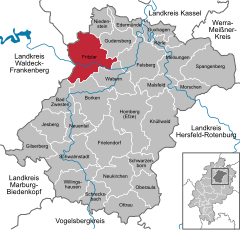
Back Fritzlar AN فريتسلار Arabic فريتسلار ARZ Fritzlar Azerbaijani فریتزلار AZB Фрыцлар Byelorussian Фритцлар Bulgarian Фрицлар CE Fritzlar (munisipyo) CEB Fritzlar Czech
This article needs additional citations for verification. (December 2011) |
Fritzlar | |
|---|---|
 View of Fritzlar | |
Location of Fritzlar within Schwalm-Eder-Kreis district  | |
| Coordinates: 51°8′N 9°17′E / 51.133°N 9.283°E | |
| Country | Germany |
| State | Hesse |
| Admin. region | Kassel |
| District | Schwalm-Eder-Kreis |
| Government | |
| • Mayor (2018–24) | Hartmut Spogat[1] (CDU) |
| Area | |
• Total | 88.79 km2 (34.28 sq mi) |
| Elevation | 170 m (560 ft) |
| Population (2022-12-31)[2] | |
• Total | 15,031 |
| • Density | 170/km2 (440/sq mi) |
| Time zone | UTC+01:00 (CET) |
| • Summer (DST) | UTC+02:00 (CEST) |
| Postal codes | 34560 |
| Dialling codes | 05622 |
| Vehicle registration | HR |
| Website | www.fritzlar.de |
Fritzlar (German pronunciation: [ˈfʁɪt͡slaːɐ̯] ) is a small town (pop. 15,000) in the Schwalm-Eder district in northern Hesse, Germany, 160 km (99 mi) north of Frankfurt, with a storied history.
The town has a medieval center ringed by a wall with numerous watch towers. Thirty-eight meters (125 ft) high, the "Grey Tower" ("Grauer Turm") is the highest remaining urban defense tower in Germany. The city hall, first documented in 1109, with a stone relief of St. Martin, the town's patron saint, is the oldest in Germany still in use for its original purpose. The Gothic church of the old Franciscan monastery is today the Protestant parish church, and the monastery's other buildings have been converted into a modern hospital. Many houses in the town center, notably around the market square, date from the 15th to 17th centuries and have been carefully maintained or restored. The town is dominated by the imposing Romanesque-Gothic Church of St. Peter from the 12th-14th centuries.
In 1974, the town hosted the 14th Hessentag state festival.
- ^ "Ergebnisse der letzten Direktwahl aller hessischen Landkreise und Gemeinden" (XLS) (in German). Hessisches Statistisches Landesamt. 5 September 2022.
- ^ "Bevölkerung in Hessen am 31.12.2022 nach Gemeinden" (XLS) (in German). Hessisches Statistisches Landesamt. June 2023.



